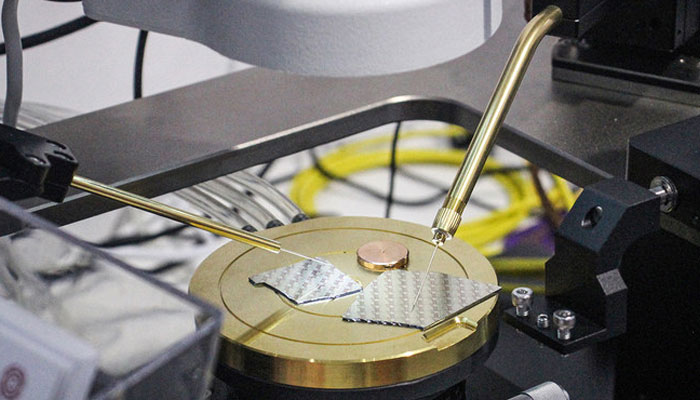Pakistan plans to develop ‘chip design cluster’ to enter global semiconductor industry
The global semiconductor market, currently valued at approximately $425 billion annually, is projected to reach $1 trillion by 2030
ISLAMABAD: The Pakistan government is developing a strategy to export integrated circuit (IC) design services, aiming to boost the skills of students and young professionals and generate foreign exchange by entering the global semiconductor industry, a government official said.
Semiconductors, also known as “chips,” are vital electronic components underpinning nearly all technological applications, significantly influencing regional, national and global industry development, economic performance and growth, as outlined in the Pakistan National Semiconductor Plan.
The global semiconductor market, currently valued at approximately $425 billion annually, is projected to reach $1 trillion by 2030.
Chips are integral to a wide array of downstream equipment and devices, such as smartphones, cars and medical devices. The market for chip-incorporating equipment is estimated to be at least $4 trillion annually, yet Pakistan’s share is less than $50 million.
“We have been working on a plan to develop an IC design cluster in Pakistan through training of students and young professionals,” Aisha Humera Moriani, additional secretary at Pakistan’s information technology and telecom ministry, told Arab News.
She said the ministry was working to boost the IC design skills through public-private partnership, following a push from the Special Investment Facilitation Council (SIFC), a civil-military hybrid forum to fix the country’s ailing economy.
“We want to export our IC design services to the world at the first stage to earn foreign exchange and create more job opportunities for the youth,” she added.
Moriani explained that Pakistan was not planning IC manufacturing at this stage since this was a “resource extensive” task, though “in the longer run we would want to set up IC manufacturing foundry with foreign investment.”
The global semiconductor industry is dominated by companies from the United States, Taiwan, China, South Korea and Japan while Pakistani universities and the private sector have been looking for government support to enter the market.
“Pakistan’s share in the global semiconductor industry is negligible at the moment as we lack government support, funds and the required human resource training,” Dr. Saad Ahmed Qazi, dean of the electrical and computer engineering faculty at Karachi’s NED University, told Arab News.
“The government should at least provide software for the training of relevant students to each university that can cost up to $50,000 each,” Qazi, who is one of the authors of Pakistan National Semiconductor Plan, 2022, said.
He informed there were three crucial parts of the IC, including designing on specific software, manufacturing and verification and testing.
“The designing and testing are cost effective processes and Pakistan can make a difference with a little initial investment of around $250 million,” he continued.
“The IC manufacturing is a resource extensive job as one has to set up a foundry for it, so Pakistan could enter into it at a later stage,” he explained, adding that some public and private universities, including NUST, FAST, LUMS and NED, were already working on the IC design in their respective faculties along with the students.
“We also need to improve our quality of education, especially in the fields of electrical, computer and electronics engineering, to produce skilled professionals for the sophisticated technology,” he said.
Qazi said three major companies, including DreamBig, Nunami and Xcelerium, had recently opened their design centers in Pakistan to export the services. “The government should provide conducive environment for foreign investments to increase the number of IC design companies,” he added.
-
 ‘Disgraced’ Andrew Still Has Power To Shake King Charles’ Reign: Expert
‘Disgraced’ Andrew Still Has Power To Shake King Charles’ Reign: Expert -
 Why Prince William Ground Breaking Saudi Tour Is Important
Why Prince William Ground Breaking Saudi Tour Is Important -
 AOC Blasts Jake Paul Over Bad Bunny Slight: 'He Makes You Look Small'
AOC Blasts Jake Paul Over Bad Bunny Slight: 'He Makes You Look Small' -
 At Least 53 Dead After Migrant Boat Capsizes Off Libya
At Least 53 Dead After Migrant Boat Capsizes Off Libya -
 'God Of War' Announces Casting Major Key Role In Prime Video Show
'God Of War' Announces Casting Major Key Role In Prime Video Show -
 Real Reason Prince William, Kate Broke Silence On Andrew Scandal Revealed
Real Reason Prince William, Kate Broke Silence On Andrew Scandal Revealed -
 Drew Barrymore Responds To 'Charlie's Angels' Costar's Comments About Her
Drew Barrymore Responds To 'Charlie's Angels' Costar's Comments About Her -
 Shakira Slips Hard On Stage During Life Show
Shakira Slips Hard On Stage During Life Show -
 King Charles Speaks Out Over Andrew's Scandal: 'Stand Ready To Help Police'
King Charles Speaks Out Over Andrew's Scandal: 'Stand Ready To Help Police' -
 Dax Shepard Recalls Horrifying Accident That Almost Killed Him
Dax Shepard Recalls Horrifying Accident That Almost Killed Him -
 Logan Paul's Bodyguard Hits Fan On Super Bowl Day
Logan Paul's Bodyguard Hits Fan On Super Bowl Day -
 Epstein Files: Anne Hathaway Mentioned As Highly Desired Guest For Bill Gates?
Epstein Files: Anne Hathaway Mentioned As Highly Desired Guest For Bill Gates? -
 Prince Harry Under A Lot Of Stress As Meghan Markle Makes Bizarre Demands
Prince Harry Under A Lot Of Stress As Meghan Markle Makes Bizarre Demands -
 Princess Beatrice, Eugenie's Subtle Break From Disgraced Parents Exposed
Princess Beatrice, Eugenie's Subtle Break From Disgraced Parents Exposed -
 Baby Left In Running Bathtub Dies After Father ‘forgets’ Him
Baby Left In Running Bathtub Dies After Father ‘forgets’ Him -
 King Charles Takes A Major Step To Keep Horrified Prince William Out Of The Loop On Andrew: Insider
King Charles Takes A Major Step To Keep Horrified Prince William Out Of The Loop On Andrew: Insider




